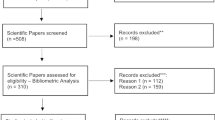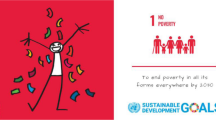Abstract
The adoption of certain innovative products, such as recycled water, artificial meat and insect-based food, could help promote sustainability. However, the disgust these products elicit acts as a barrier to their consumption. Here, we show that describing such products in a foreign language attenuates the disgust these products trigger and heightens their intended as well as actual consumption.


Similar content being viewed by others
References
Santiago, J. 4 billion people face water shortages, scientists find. World Economic Forum (17 February 2016); https://www.weforum.org/agenda/2016/02/4-billion-people-face-severe-water-scarcity-at-least-for-one-month-every-year
Goodyear, D. Grub: eating bugs to save the planet. The New Yorker (15 August 2011); http://www.newyorker.com/magazine/2011/08/15/grub
Rozin, P., Haddad, B., Nemeroff, C. & Slovic, P. Judgm. Decis. Mak. 10, 50–63 (2015).
Verbeke, W. et al. Meat Sci. 102, 49–58 (2015).
Verbeke, W. Food Qual. Prefer. 39, 147–155 (2015).
Pavlenko, A. Int. J. Psychol. 47, 405–428 (2012).
Caldwell-Harris, C. Curr. Dir. Psychol. Sci. 24, 214–219 (2015).
Puntoni, S., de Langhe, B. & van Osselaer, S. J. J. Consum. Res. 35, 1012–1025 (2009).
Harris, C., Aycicegi, A. & Gleason, J. Appl. Psycholinguist. 24, 561–571 (2003).
Keysar, B., Hayakawa, S. L. & An, S. Psychol. Sci. 23, 661–668 (2012).
Costa, A. et al. PLoS ONE 9, e94842 (2014).
Geipel, J., Hadjichristidis, C. & Surian, L. J. Exp. Soc. Psychol. 59, 8–17 (2015).
Haidt, J. Psychol. Rev. 108, 814–834 (2001).
Hadjichristidis, C., Geipel, J. & Savadori, L. J. Exp. Psychol. Appl. 21, 117–129 (2015).
Preacher, K. J. & Hayes, A. F. Behav. Res. Methods 40, 879–891 (2008).
Maslow, A. H. Psychol. Rev. 50, 370–396 (1943).
Hayes, A. F. & Matthes, J. Behav. Res. Methods. 41, 924–936 (2009).
Marian, V. & Neisser, U. J. Exp. Psychol. Gen. 129, 361–368 (2000).
Menegaki, A. N., Mellon, R. C., Vrentzou, A., Koumakis, G. & Tsagarakis, K. P. J. Econ. Psychol. 30, 285–292 (2009).
Brislin, R. W. J. Cross-Cult. Psychol. 1, 185–216 (1970).
Acknowledgements
We thank S. Puntoni, J. Levav and L. Burnett for valuable comments on preliminary versions of this manuscript and J. Bekkers and J. Klesse for assisting with data collection. Financial support from the Netherlands Organization for Scientific Research (VENI grant 451-15-023 awarded to A.K.) is gratefully acknowledged.
Author information
Authors and Affiliations
Contributions
J.G. and C.H. developed the study concept. All authors contributed to the study design. J.G. performed testing and data collection for Experiments 1–3 and A.K. coordinated data collection for Experiment 4. J.G. performed the data analysis and interpretation under the supervision of C.H. and A.K.; J.G. and C.H. drafted the manuscript, and A.K. provided critical revisions. All authors approved the final version of the manuscript for submission.
Corresponding author
Ethics declarations
Competing interests
The authors declare no competing financial interests.
Additional information
Publisher’s note: Springer Nature remains neutral with regard to jurisdictional claims in published maps and institutional affiliations.
Supplementary information
Supplementary Information
Supplementary Methods, Supplementary Results, Supplementary Figs. 1,2 and Supplementary Tables 1–9.
Supplementary Data Sets
Data related to Experiments 1–4.
Rights and permissions
About this article
Cite this article
Geipel, J., Hadjichristidis, C. & Klesse, AK. Barriers to sustainable consumption attenuated by foreign language use. Nat Sustain 1, 31–33 (2018). https://doi.org/10.1038/s41893-017-0005-9
Received:
Accepted:
Published:
Issue Date:
DOI: https://doi.org/10.1038/s41893-017-0005-9
- Springer Nature Limited
This article is cited by
-
Will Using a Foreign Language Attenuate the Neophobia?
Journal of Psycholinguistic Research (2023)
-
To intervene or not: the game of recycled water use for residents with different preferences
Environmental Science and Pollution Research (2023)
-
Use of a language intervention to reduce vaccine hesitancy
Scientific Reports (2022)





